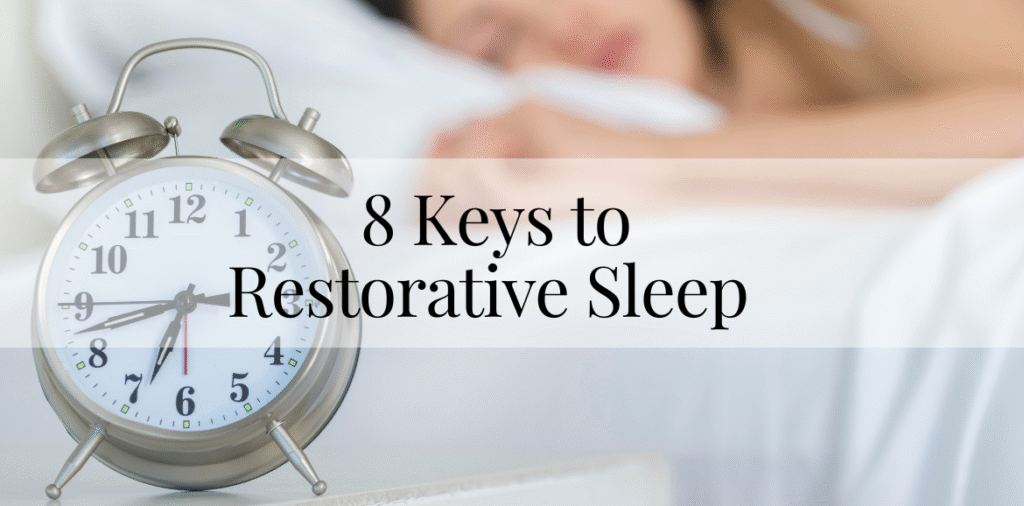
Do you wake up feeling tired? Do you need coffee to get going each day? Do you get to the afternoon and start to feel groggy? Or, do you crave sweets in the afternoon? If you answer yes to any of these questions, you may not be getting enough restorative sleep each night.
Disrupted sleep is a common complaint of many people. In fact, poor sleep contributes to weight gain, cravings, low energy, lack of motivation, poor memory, anxiety, depression, decreased immunity, and is linked to many serious chronic health conditions.
Here are some tips to help you sleep your best.
Aim to go to sleep each night by 10 PM
Your body’s internal clock is based on the cycle of the sun. As the day progresses, your body’s cortisol production gradually declines in preparation for sleep. At the same time, your melatonin production increases at night in order to promote restorative sleep. If you are not sleeping between the hours of 10 PM to 4 AM, your body misses out on the opportunity to heal and repair itself. In fact, studies show that the 2 hours of sleep you get before midnight actually count as 4 hours of sleep after midnight. That is because these initial hours are when you tend to get the deepest sleep, which is critical for repair and restoration processes in the body, as well as balancing your hormones and resetting the nervous system.
Don’t exercise in the evening
Exercising at night can spike your cortisol levels. This will actually give you a “second wind”. This disruption in your natural circadian rhythm can disrupt your hormone balance and your blood sugar levels. The energy bursts many feel after exercise will make it difficult to wind down and get in bed at a good time. If you do choose to exercise in the evening, stick to moderate walking, restorative yoga, or stretching…basically anything that promotes relaxation.
Establish a bedtime routine or ritual
Incorporating activities that promote winding down and relaxation are good for helping to prepare your body to go to sleep. These activities can include turning off the TV, taking a hot shower or bath, reading a book, journaling, or meditating. Avoid activities that will excite or energize your body.
Minimize your blue light exposure
Blue light that is emitted by electronic devices, such as cell phones, tablets, computers, and even the TV, stimulate your nervous system and interrupt your natural circadian rhythm. This can result in feeling “wired and tired” or like a “night owl”, causing you to ignore your body’s natural rhythms and stay up later than you should. Staying up late inhibits your body’s ability to recover, making you feel tired, groggy, overwhelmed and absent minded the next day. Often it is helpful to set a reminder on your phone to alert you to turn off devices at least an hour before bedtime. If you must be on your device, be sure to turn the device to “night shift” mode, employ a blue blocking app, or wear blue blocking glasses (or all 3!).
Reduce exposure to artificial lights in your home at night
Before the lightbulb was invented, people naturally slowed down and stopped most activities due to limited light. Now, we are used to being “go-go-go” from sunup to bedtime. This goes against our natural biological rhythms and sleep/wake cycles. Our goal is to mimic the natural decrease in light, much like what happens when the sun sets. The setting sun, decreasing light, and lowering temperature all serve as signals to our body to increase our melatonin production in order to help you wind down and prepare your body for sleep. This can be done by turning off overhead lights, using minimal lamps, dimming lights when possible, or even using candles.
Prepare your bedroom for optimal sleep
People sleep best when the bedroom temperature is 68 degrees or less. In addition, using black out curtains helps to keep any outside light from creeping in, which can greatly improve sleep quality. In fact, it is helpful to cover ANY and ALL light sources in your bedroom, which includes alarm clocks, electronic devices, etc. Also, limiting EMF exposure in the bedroom is key to helping your body fully rest and regenerate, so keep cell phones out of the bedroom and turn off or unplug any electronic devices.
Keep your blood sugar balanced throughout the night
If your blood sugar drops at night while you are sleeping, that can trigger waking up. The best ways to avoid blood sugar drops include avoiding sugar and alcohol before bedtime, minimizing carbohydrate consumption at night, and also eating dinners or snacks that are higher in protein and fat.
Expose yourself to natural daylight every morning
Your body has a natural circadian rhythm that is established by exposure to bright daylight (it even works on cloudy days). Exposure to light helps to mobilize cortisol in order to get you up and going for the day. This is when your cortisol should naturally be elevated. This rhythm promotes energy production during the day, but it also promotes better health, balanced hormones, and more restorative sleep each night as well. Try eating breakfast outside or going for a walk in the morning.
All of these tips will help you get more restorative sleep each night. Not only will you wake up with more energy, but this will also help to improve your overall health, balance your hormones, support your immune system, and even help to renew your brain. Aim for at least 7-8 hours of sleep each and every night, going to bed by 10 PM. Soon you will be waking up feeling restored and refreshed, ready to take on your challenges and passions!






